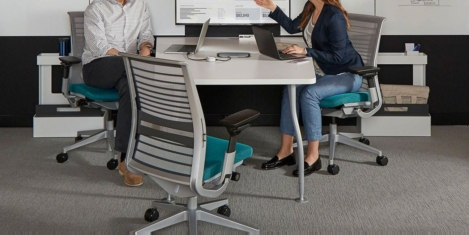April 6, 2017
Designing space for virtual collaboration in an untethered world 0
 Working with colleagues across different geographies and time zones has become the norm since an increasing number of organisations now integrate and seek collaboration at a global level. Interestingly, according to Cisco, 62 percent of workers now regularly collaborate with people in other countries. These globally integrated enterprises (GIE) aim to draw in the best talent from across the world, delivering maximum innovation and efficiency. The rise of global and distributed teams has been further encouraged by the popularity of remote working, with 71 percent of office workers now choosing greater flexibility to work from various locations instead of travelling to the office everyday . And the trend only looks set to gain pace, with 56 percent of senior leaders in large global companies expecting global teams to increase in the next one to three years.
Working with colleagues across different geographies and time zones has become the norm since an increasing number of organisations now integrate and seek collaboration at a global level. Interestingly, according to Cisco, 62 percent of workers now regularly collaborate with people in other countries. These globally integrated enterprises (GIE) aim to draw in the best talent from across the world, delivering maximum innovation and efficiency. The rise of global and distributed teams has been further encouraged by the popularity of remote working, with 71 percent of office workers now choosing greater flexibility to work from various locations instead of travelling to the office everyday . And the trend only looks set to gain pace, with 56 percent of senior leaders in large global companies expecting global teams to increase in the next one to three years.









 It is two years since the introduction of Shared Parental Leave (SPL), where couples were given the ability to share leave surrounding the arrival of a new addition to their family; and while sharing leave is seen to have a profound beneficial impact for the family, there are still plenty of barriers. According to
It is two years since the introduction of Shared Parental Leave (SPL), where couples were given the ability to share leave surrounding the arrival of a new addition to their family; and while sharing leave is seen to have a profound beneficial impact for the family, there are still plenty of barriers. According to 










 Today (29 March) the Prime Minister triggers Article 50 to begin the UK’s exit from the European Union, and a new piece of research claims that almost two thirds (62 percent) of HR professionals expect this to impact their HR strategy and more worryingly, over a third (35 percent) say that the leave vote will impact the profits of their business. According to the research from employee benefits specialist Secondsight, 37 percent have opted not to hire over the coming year, and 39 percent agreed that recruiting the right people into their business will now be more difficult than before the decision to leave was made. However, on a more encouraging note, 95 percent of the HR professionals surveyed will see their budget rise in 2017, and 18 percent plan to introduce new benefits in the year ahead.
Today (29 March) the Prime Minister triggers Article 50 to begin the UK’s exit from the European Union, and a new piece of research claims that almost two thirds (62 percent) of HR professionals expect this to impact their HR strategy and more worryingly, over a third (35 percent) say that the leave vote will impact the profits of their business. According to the research from employee benefits specialist Secondsight, 37 percent have opted not to hire over the coming year, and 39 percent agreed that recruiting the right people into their business will now be more difficult than before the decision to leave was made. However, on a more encouraging note, 95 percent of the HR professionals surveyed will see their budget rise in 2017, and 18 percent plan to introduce new benefits in the year ahead.












April 3, 2017
Brexit should be a chance for the UK to enshrine employment rights 0
by Chris Rowley • Comment, Legal news, Workplace
(more…)